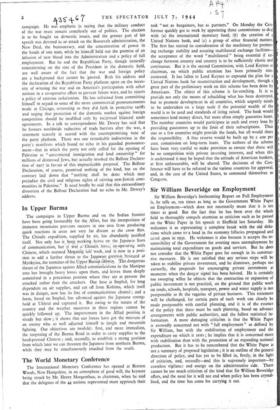The World Monetary Conference
The International Monetary Conference has opened at Bretton Woods, New Hampshire, in an atmosphere of good will, the keynote being struck by Mr. Henry Morgenthau, as chairman, when he said that the delegates of the 44 nations represented must approach their
task " not as bargainers, but as partners." On Monday the Con- ference quickly got to work by appointing three commissions to deal with (a) the international monetary fund, (b) the creation of a United Nations bank, and (c) a group of other financial matters. The first has started its consideration of the machinery for promot- ing exchange stability and assuring multilateral exchange facilities— the acceptance of the word "multilateral" being essential if ex- change between country and country is to be sufficiently elastic and continuous. But it is the second Commission, with Lord Keynes as chairman, on which public attention has been primarily con- centrated. It has fallen to Lord Keynes to expound the plan for a United Nations bank for reconstruction and development, though a great part of the preliminary work on this scheme has been done by Americans. The object of this scheme is far-reaching. It is to provide not only the means of rebuilding what has been destroyed, but to promote development in all countries, which urgently needs to be undertaken on a large scale if the potential wealth of the world is to be used and standards of iiving raised. The bank would
sometimes lend money direct, but more often simply guarantee loans. The member countries would participate in each and every loan by providing guarantees up to the limit of their subscriptions. Thus one or a few countries might provide the funds, but all would share the responsibility. A free reserve would be built up by a one per cent. commission on long-term loans. The authors of the scheme have been very careful to make provision to ensure that there will be no competition with private investing interests, and when this is understood it may be hoped that the attitude of American bankers, at first unfavourable, will be altered. The decisions of the Con- ference will have to be referred to the various countries for approval, and, in the case of the United States, to commend themselves to Congress.


























 Previous page
Previous page